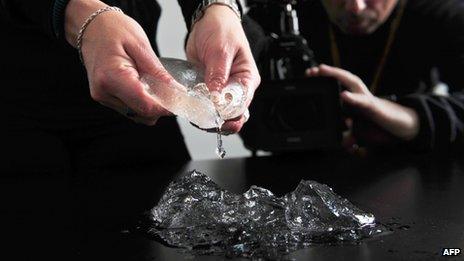PIP implant scandal: German firm ordered to pay damages
- Published

Some 400,000 women across the world were fitted with faulty PIP implants
A French court has ordered a German company to pay compensation to hundreds of women who were fitted with defective breast implants.
TUV Rheinland, which awarded EU safety certificates to the French implant manufacturer, "neglected its duties of vigilance", the court said.
PIP (Poly Implant Prothese) was shut down in March 2010 amidst a worldwide health scare.
The company used sub-standard silicone gel, causing many implants to rupture.
Six implant distributors and 1,700 women had sued TUV Rheinland for 50m euros (£42m), arguing anything but a cursory inspection would have found problems.
The plaintiffs in the civil case will be given an initial payment of 3,000 euros per victim for surgery to have the implants removed.
Jan Spivey, a British woman who received PIP implants as part of reconstructive surgery following breast cancer in 2002, said she was "delighted" with the ruling.
"Of course TUV has some responsibility and should be held to account. They're the organisation that gives the CE certification for safety, and that was what my surgeon relied on when he gave the implants to me.
"Anybody that gives safety certification for a product that is going to make women very sick does have responsibility," she told the BBC's Newshour programme.
It could open the door to many more compensation claims, says the BBC's Christian Fraser in Paris.
TUV Rheinland had won two previous cases in Germany. This was the first such case in France.
The German firm has said it will appeal against the verdict.
Hidden from view
TUV Rheinland awarded PIP - formerly one of the world's leading suppliers of implants - its European safety certificate for 17 years.
Carol Robson, who was one of the 1,700 plaintiffs. said she was "happy" with the compensation ruling
The founder of PIP, Jean Claude Mas, is still on trial for aggravated fraud in Marseilles, along with four of his executives.
He revealed during police interviews that he had ordered employees to hide the unauthorised silicone when inspectors visited his factory.
It has since emerged the substandard gel was used in 75% of the implants.
The court heard an employee in charge of quality control had only a cooking diploma - another in charge of the lab had previously trained as a pastry chef, our correspondent says.
A ruling is expected in Jean Claude Mas' case on 10 December.
- Published17 April 2013
- Published10 December 2013
- Published14 May 2012